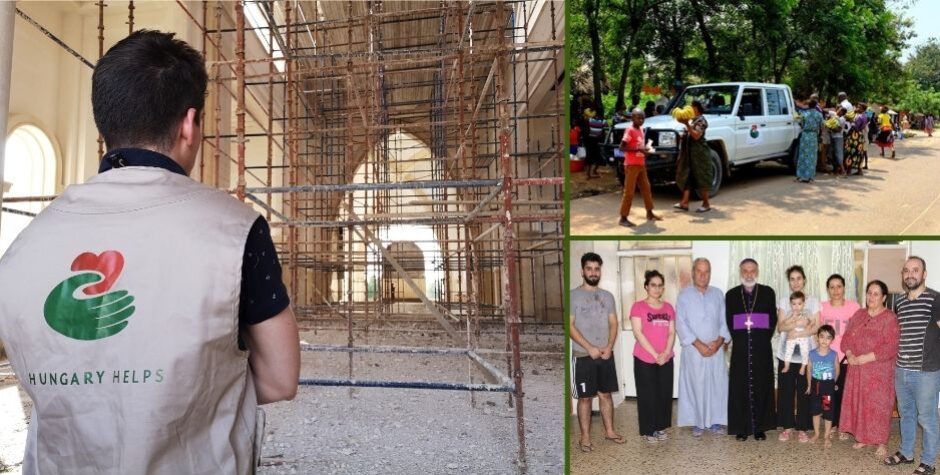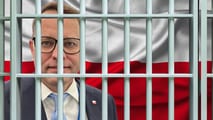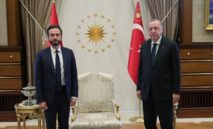

Interview with Tristan Azbej, State Secretary for the Aid of Persecuted Christians and the Hungary Helps Program
Hungary: Interview with Tristan Azbej
Tristan Azbej is the State Secretary for the Aid of Persecuted Christians and the Hungary Helps Program. Translated from Hungarian to English.
It is rare that a country’s government handles the issue of religious freedom, including the protection of persecuted Christians as a high-level priority. Why does the Hungarian government consider this issue as a priority?
Our position is based on the fact that, currently, Christianity is the most persecuted religion in the world. This means that Christians are persecuted in the largest numbers in the world because of their faith and their beliefs. Organizations for human rights, such as the Open Doors, and the Truro report for the British Foreign Office confirm what our research suggests: more than a quarter of a billion people in the world suffer disadvantages and are discriminated against for their Christian faith. Four out of five people persecuted and discriminated against for their faith and religious beliefs are Christians. Although we currently find this as one of the most serious human rights crises in the world, we notice that this issue is not addressed by the international organizations. The problem is among the most serious human rights crises and it is obviously one of the most hidden.
We think that the reasons why international organizations do not deal with the persecution of Christians, and why they try to hide this crisis are mainly political and ideological. The Hungarian government recognized this in 2016, as well as the need to support persecuted and discriminated Christians. The first is always the deeds: in early 2017, we launched an international humanitarian program specifically designed to alleviate the humanitarian emergency of Christians and other groups persecuted for their religion, in the form of a specific support operation.
In addition, we decided to represent the cause of persecuted Christians in international forums. The fact that the Hungarian government was the first, and so far, the only one in the world to set up a separate government unit, the name of which includes the position responsible for helping persecuted Christians is a message in itself. We have decided to take over the representation of this matter because no one else has done so until now. The decision is based not only on humanitarian considerations but also on value perspectives. Since we consider Hungary a Christian-based nation and our cultural roots are also Christian, we believe that we owe solidarity to the people who are suffering innocently.
At the United Nations, there is already a special rapporteur position for religious freedom, but you have mentioned that there is not enough work in these forums to protect Christians. Is there any co-operation between the State Secretariat and the UN Special Rapporteur in this regard? Does the UN support the efforts of the Hungarian government?
The delegations of the Hungarian government to the UN have repeatedly added this issue to the agenda, at the General Assembly of the UN in New York and at the UN Human Rights Council in Geneva. Besides, we have organized specific events and side-events on the topic, and we represent the cause of persecuted Christians in all other related discourses. At the same time, we see that in connection with all forms of religious persecution, attempts are being made to displace Christian persecution as a reference. There are many examples of attempts to downplay or conceal the very existence of the persecution of Christians and highlights all human rights violations of other groups of conscience and religion conversely. Consequently, the issue of the persecution of Christians does not receive the adequate attention. The UN Special Rapporteur on Freedom of Religion or Belief produced a report in February that, interestingly, reflects efforts against the protection of freedom of religion. For instance, the report focuses more on the matter that different religious groups should not overshadow LGBTQ than the calvary of Christians as the most persecuted religious group in the world.
Following the example of the position in the UN, would you consider it necessary to create a position of Special Envoy or Rapporteur on the issue of religious freedom at the Council of Europe?
Before answering the question about the Council of Europe, it is also worth examining the system of institutions of the Union. The EU has, more specifically, had a Special Envoy on the promotion of freedom of religion or belief outside the European Union in the previous Commission term. The Special Envoy dealt with various forms of religious persecution in an appropriate proportion, and drew attention to the persecution of Christians. He also acted in such cases, which made him a target of political attacks e.g. by atheist interest organizations that tried to weaken his claim of the existence of persecutions of Christians and accused him of being biased. This position, after the new Committee was formed, has not yet been filled. We hope they will fill it. In addition, to the best of my knowledge, there is no dedicated official for this matter in the Council of Europe.
Do you think that it would be necessary to create such a position in the Council of Europe as well?
It would be necessary. Next year, Hungary will hold the rotating presidency of the Council of Europe for half a year. In the program of Hungary’s presidency, we will present the issue of religious freedom and the protection of Christians at several points.
The Hungarian government has repeatedly stated that it intends to take a pragmatic approach in its foreign policy and diplomacy. At the same time, as you mentioned, the priority of the government is to protect Christianity, Christian values. Sometimes this might lead to contradictory foreign policy and diplomatic moves. Does such a contradiction appear in your work, does it make the activities of the State Secretariat and Hungary Helps more complicated?
I cannot accept the existence of such contradictions as a starting point raised in the question, we could discuss this case by case. In any event, the Hungary Helps Program is primarily a humanitarian aid program, which means that we try to save lives and help communities to stay in place when there is a humanitarian threat to life and staying in place. It has never happened to us that we have not supported a Christian community that has approached us with a humanitarian need or for help, because this would have jeopardized diplomatic relations. So those we could help because we had the right resources and technical solution, and who asked us for humanitarian help, we did help.
As for standing up for religious freedom on the diplomatic stage, Hungary is not in the same position as any major world economic power. What we can apply is only negotiations. For example, we do not have any sanction tools to put pressure on the government of another country to better protect the rights of religious communities. Therefore, since negotiation is the only tool available, we can only use that. There are several attacks against the Hungarian government for failing to act against our important diplomatic partners, who are believed to persecute Christians or other religions. In these cases, if it is actually true that religious communities are persecuted, taking action against them would not only be pointless, but would be expressly counterproductive. The best that we can do in these cases, for these Christian communities, is to negotiate with the state and government in an open dialogue, in accordance with the diplomatic framework.
On a case-by-case basis, Turkey could be such an example, since its government declared the Hagia Sophia, which had previously operated as a museum, a mosque in the summer of 2020. The Hungarian government did not condemn this decision, as it would be at the expense of strategic relations, according to the government’s position. In a situation like this, can the Secretary of State for Persecuted Christians help in the ways you mentioned, what do these forms of negotiation that you mentioned actually mean?
As the matter of the Hagia Sophia Mosque came up, we immediately contacted religious leaders in Turkey and noted that they had no humanitarian needs, so we could not intervene with our primary tool and come to their aid as there was no need for it. Apart from this, as far as politics are concerned, Hungarian politicians of the governing party have joined the EU statement condemning the transformation into a mosque in terms of cultural heritage protection, calling on the UNESCO to request Turkey to preserve the original status of the Hagia Sophia. At the same time, with regard to the Hagia Sophia complex, we have to note that the cultural message of the decision is extremely unfortunate, otherwise its practical significance - apart from the symbolic bad message - is quite minimal. The practical significance of the decision is that on Fridays there are areas of the complex that cannot be entered with shoes, as well as covering various Christian references and memories for a period of time.
Another similar specific case is China, where the World Watch List’s 2020 report on persecution of Christians says the rate of persecution of Christians falls into the very high category. Can the State Secretariat and Hungary Helps help Christian minorities in China in any way if they need humanitarian assistance?
If such a demand comes to us, we will naturally consider whether we can help. Nevertheless, we believe in a diplomatic solution here as well, and the driving force behind this diplomatic solution is the Holy See. We follow the work of the Holy See and His Holiness Pope Francis with great confidence, which has already resulted in an interim agreement between the Vatican and Beijing, that has also been extended since then. We do not want to be more Pope than the Pope in this regard, but we support the efforts of the Holy See and we are optimistic about these diplomatic processes.
As the last concrete case, the Azerbaijani-Armenian conflict arises, especially in connection with the government’s communication on Azerbaijan’s aspirations. Regarding this conflict, Hungary reaffirmed its support for the territorial integrity of Azerbaijan so in essence, Hungary acknowledged the country’s military aspirations for the acquisition of Nagorno-Karabakh that has been under Armenian control within the Azerbaijani border, but several Western European states have either expressed their concern or did not take a position on this issue. How do you assess the position of the Hungarian government on this issue in the context of the protection of Armenian Christian communities?
First of all, I would like to lay down that in the case of the Karabakh conflict, there is no question of religious conflict, religious persecution or persecution of Christians. This is not only my statement, but the Armenian Apostolic Patriarch Karekin II also recorded this. So, this is a conflict between two countries. The Hungarian foreign affairs position in this regard is that we are in favour of a negotiated settlement and we urge the parties to continue the negotiated settlement, that, for example, is being concluded in the Ministerial Working Group on the Resolution of the Karabakh Conflict by the parties. It also includes that accordingly we do not support armed settlement and call for a ceasefire. In addition, Hungary generally adopts the principles of international law and we can be linked to a group by any cultural connection, we have to be consistent with the importance of the territorial integrity of individual nations.
However, despite the lack of religious persecution, the Hungary Helps program not only deals with persecuted Christians, but also with assistance in humanitarian emergencies in general, not specifically in religious conflicts, but, for example, also in cases of natural disasters. As a result, anyone who accuses the Hungarian government and our program of not showing solidarity with suffering people in crisis, regardless of their ethnicity, is wrong.
We dealt with the humanitarian crisis caused by the Karabakh conflict, after many internal and external refugees trying to find refuge from the war, so we sent tens of millions of forints of emergency aid to Armenia to help the civilians who fled there. From this aid, the care of hundreds of refugee families was provided by local, not state, but Christian charities. In this way, we come to the aid of the innocent people suffering in humanitarian crisis.
You mentioned that the government is prioritizing negotiation solutions. According to recently published news, under the peace agreement to be reached between Armenia and Azerbaijan, Azerbaijan could retain the territories it has acquired from Nagorno-Karabakh in the current conflict. How do you assess these developments as a Secretary of State of Armenian origin of the Hungarian Government that supports these efforts?
It is not for me, but for the Ministry of Foreign Affairs, to issue a statement on this matter. If you ask me not as a government official but in my private capacity, I certainly welcome the part that the bloodshed will hopefully end, because not only the number of military casualties has increased dramatically recently, but the realistic prospect of a humanitarian catastrophe has raised in front of us. At the same time, the integrity of nations and international law must be respected. We also request no one to interfere in our own sovereignty. On the other hand, it is very important for Armenians to maintain their presence in the Caucasus in general and in the Middle East as a minority. It is also very important from a humanitarian, cultural and civilizational point of view, Armenians are the eldest and one of the easternmost bastions of Christian civilization and culture. Armenians are the first Christian nation, and their survival is important.
Returning to professional government work after the private opinion: we support the Armenian communities, the survival of the Armenian church and culture in other ways as well. The communities affected by the civil war and genocide in Syria and Iraq have been and will continue to be supported in a humanitarian way and in reconstruction, but this affects the area of Iraq, Syria and Lebanon.
What exactly can Hungary Helps do in crisis-stricken countries, what are the most appropriate tools to achieve the goals of the program?
In general, Hungary Helps has several types of support activities. First and foremost is the life-saving aid. If an acute conflict situation develops, a disaster or a terrorist attack happens, we will provide quick help, whether financial or medical, to save lives. The other activity is the long-term humanitarian aid, with which we support the survival of internally displaced refugee communities or even those who have remained in the region. We support staying in place in various ways, such as the on the areas of housing, health, education, so that these communities can stay, at least, in the region and once normalization has taken place, move back to their homeland and not be forced to migrate. This is the support activity we have carried out, for example, in the case of the Armenian community in Syria and Aleppo, where we have supported the remain of families returning from refugee status. The third type of activity is providing reconstruction aid, when we help the reconstruction of demolished residential buildings, schools, health infrastructure or even churches. If Armenia has already been mentioned several times, in the case of Syrian Armenians, we also support the reconstruction of a bombed church, community houses and residential buildings. These are our specific material tools.
The previous question focused on the specific tools. Besides, what can the government do, what diplomatic tools can it use to protect religious freedom and to protect persecuted Christians?
Hungary is not in a position of diplomatic power to place any moment at another point on Earth to ensure that religious freedom is better protected by a given country. Therefore, the only opportunity, that we also use, is to participate in and keep the topic on the agenda of various international organizations, processes, and forums. There are several forums where Hungary is very active in advocating and representing the cause of persecuted Christians. For example, the International Federation for Religious Freedom was formed in Washington in February this year. This alliance already has approximately thirty members, so many governments have joined. At the same time, we were the second after the founder United States and the first European country to join this initiative. Besides, we consistently represent two issues, the protection of persecuted Christians on the one hand, and on the other, the continuation of humanitarian aid program to help persecuted, discriminated, or threatened religious groups. In addition, there is an annual ministerial-level international forum on religious freedom, with dozens of governments represented at the highest level.
What do you consider as your greatest achievement as Secretary of State for this case? In general, what can be achieved as the Secretary of State of a Central European country on an issue that is also deeply intertwined with international humanitarian elements?
Research shows that there is a quarter of a billion persecuted or threatened Christians, and that’s a huge crowd of people. In light of this, from the point of view of our humanitarian aid policy, we have no illusions that, as far as saving lives is concerned, whatever we do can only be a drop in the ocean. On the scale of Hungary, of course, no one can expect the Hungarian government and the Hungarian people to solve this problem alone. At the same time, there is a saying that whoever saved a human life saved a universe. As a result, although it may seem proportionally insignificant, I am very proud, and I think it may be a common pride of the Hungarian people that we have had a total of one hundred thousand beneficiaries in the Hungary Helps Program in just over three years.
This means that we have given hundreds of thousands of people either life-saving support or support that has prevented them from migrating from where they lived or their homeland. We also supported the return of many families from migration. In terms of population, this is our result. In addition, there is one of our 85 support projects, which is outstanding in many ways because, if I may use slightly elevated words, it brings hope. This project is related to a settlement in Iraq, on the Nineveh Plains, so a Christian-inhabited area since biblical times, called Tel Askuf. This settlement was invaded and completely occupied by the Islamic State in 2014. Members of the Chaldean Christian community living there, who could not escape, were killed by the Islamic State. Two years later the settlement was liberated, but by then nine hundred buildings were already in ruins, the church and kindergarten were demolished and, of course, the settlement was emptied, the members of the community lived as refugees. As a part of the Hungary Helps Program, the Iraqi church rebuilt the settlement, resulting in the return of almost 1,000 of the 1,300 families who had fled. Therefore, three-quarters of this community were helped with a targeted grant to return to their former place of residence. This is very significant because during this time, in the last decade and a half, the total population of Iraqi Christians has fallen to less than one-fifth: from one and a half million to two hundred thousand. This is a dramatic, eighty percent decrease. Nevertheless, we were able to save a community. It is a good illustration that the locals renamed the settlement from Tel Ascuf to Tel Ascuf bint al-Majjar that suffix means “daughter of Hungary”. We are not presenting this program as a PR stunt, but because we are trying to persuade other governments to join us and launch such projects as well.
Finally the third result, not in a priority order, which even goes beyond helping hundreds of thousands of people and beyond saving an entire community, is that we have been able to successfully represent this problem: it is no longer possible to sweep the subject of the persecution of Christians under the rug. In addition, we were able to persuade other countries to follow the Hungarian example, including the United States. Following the Hungarian model, the United States launched a program to help persecuted Christians in Iraq, in cooperation with Hungary. If we have been able to convince the United States, we have already been able to convince the world-leader superpower on this issue, so from now on, considerable resources will be available.
It is known that the Hungarian Government considers the refugee issue to be solved primarily at a regional level, however, there may be a situation where refugees are separated from the region as well. Does Hungary grant visas or refugee rights to these refugees, possibly specifically to Christian refugees, and does the State Secretariat have a role in the asylum procedure?
Our basic statement is that migrants should be kept away from Hungary and Europe, because we consider mass migration, especially uncontrolled, a dangerous process. And it is not a fundamental human right for anyone to be able to decide which country they want to live in, simply based on the standard of living. At the same time, not only the various human rights conventions, the Geneva Conventions, but also our Christian solidarity, oblige us that accept those who save their lives. At the same time, this applies mutatis mutandis to the case when Hungary is the first refuge from a neighbouring country to which someone can escape. Our basic principle, then, is that people who come from neighbouring countries and regions saving their lives must be accepted. This makes sense in every way, because we understand what someone has to escape when they flee from Syria to Turkey, but what a life-threatening risk or factor there could be for someone to cross the borders from Greece to Northern Macedonia, from Northern Macedonia to Serbia, and from Serbia to Hungary. However, it can happen that someone is being persecuted along the way. That is why we also have such legal competence that if someone who comes to Hungary is subject to religious persecution, they will involve our State Secretariat in the asylum process. In legal terms, we are a co-authority in asylum procedures. We have gathered a great amount of information about religious persecution, so in these cases we issue an expert opinion on whether the asylum seeker can invoke religious persecution as a basis for their request.
What do you think about the situation of religious freedom in Europe? Is Christianity really in a difficult situation, is it facing real danger and real risks, or is it nothing more than a right-wing narrative?
Freedom of religion and freedom of conscience are guaranteed as human rights in the EU. Nevertheless, we observe that there is a political aspiration that seeks to crowd out Christianity from public discourse, as well as from all public spaces in a figurative and real sense as well. So there is a process that does not fulfil the category of deprivation of human rights, but there is a clearly anti-Christian sentiment that tries to crowd out this social perception, worldview, and cultural circle. We see that there are certain cases where there is an attempt to curtail free religious practice, or at least public religious practice. These are, for example, when measures are taken to ensure that a civil servant is not allowed to wear religious symbols in some countries, or when they start to expel people, even in private companies, for these reasons. The European Court of Human Rights has upheld the right of an employer to fire workers without justification for wearing a religious symbol, such as a cross or the Star of David. So it can be a reason for expelling workers because they wear religious symbols. This cannot be challenged, the Court of Justice has made such judgment and thus set a precedent. In addition, there were several examples that statues, religious symbols placed on the outskirts were removed by the authorities. This was the case, for example, with the removal of a statue of Pope St. John Paul II in France, with the removal of crosses, and a ban on the display of nativity scenes in several states in the United States.
As for the threat to Christianity, there has been an unfortunate and dramatic increase in anti-Christian and anti-Semitic acts of violence. This is due to several radical systems of ideas. I can give two recent examples for this: In France, an Islamist terrorist killed three people in a church and beheaded a believer, an older woman. A few days later, in Poland, extremist liberal activists abused and beat a priest during a demonstration. Thus, among the religious groups, the physical threat of Christians also appeared in Europe, among other forms of religious intolerance.
After the attacks in France, two Muslim women were attacked at the Eiffel Tower, and in Poland, protesters were abused by far-right protesters. Are these threats, according to the Government, at the same level as attacks and threats against Christians or are the attacks against Christians more important and greater?
In this matter, in principle, only a subjective benchmark could be attempted to be set up. However, let’s try to be as objective as possible: first of all, I would like to say that suffering and persecution are not a competition, there cannot be a martyrdom race. We emphasize that Christianity is the most persecuted religion in the world because the numbers show it and we need to talk about it because the mere existence of the persecution of Christians is currently being debated in public discourse. So it’s not that we want to show Christianity as being in a martyr position, we just want to present the facts and we want the world to accept it. Therefore, this is how we treat all statistics and numbers: this is not a competitive situation, but we can still make the most objective findings based on numbers. Data are available from some countries, e.g. from France. Religious-based acts of violence are categorised by religion.
The 2019 report by the French Ministry of the Interior reports 1,052 anti-Christian atrocities, which means that since 2016, nearly 3 anti-Christian attacks have taken place there every day. Besides, 687 anti-Semitic cases were registered last year, an increase of 27 percent compared to the previous year. 154 Islamophobic attacks have been registered in the same French report. This is seven times less than against the Christian community. I would add: this is still 154 more than it should be, but we have to see the proportions: there were more than seven times as many anti-Christian acts and four times as many anti-Semitic acts. Everyone’s suffering is important, but the proportions must be taken into account when we act and discuss these issues.
What plans and programs will the State Secretariat keep on the agenda for the future, what will be the most important objectives for the upcoming years?
As far as our humanitarian aid policy is concerned, although the situation in the Middle East has not been resolved, it has at least stabilized with the quasi-state-like military defeat and fall of the Islamic State, so our basic goal there is to continue and sustain our activities. At the same time, the focus of the persecution of Christians having their lives at risk has clearly and markedly shifted to the sub-Saharan African region. In some areas, the persecution of Christians has even reached the level of genocide in some places. For this reason, in recent months and last year, we have expanded and plan to expand further our humanitarian programs in Africa.
On the other hand, due to the demographic leap, a migration crisis is also expected, directed at Europe in the form of a continuous and growing wave of migration. In addition, we have specific aims as well. At the diplomatic level, our plan is to create an alliance of countries that take actions against the persecution of Christians, a humanitarian cooperation, by networking with as many governments as possible. Finally, one of our programs with a Hungarian social impact that we are planning is the development of the Volunteer Program of the Hungary Helps Voluntary Program. As soon as the epidemic situation and the security situation allow, we would like to give this opportunity to the many Hungarians who have approached us to support our program and want to get involved.











